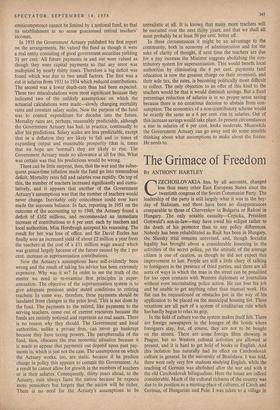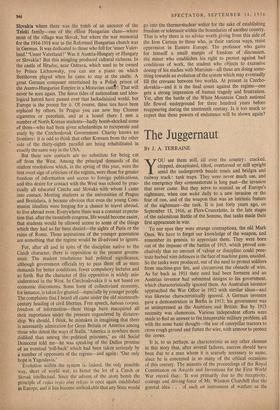The Grimace of Freedom
BY ANTHONY HARTLEY CZECHOSLOVAKIA has, by all accounts, changed less than many other East European States since the twentieth congress of the Soviet Communist Party. The leadership of the party is still largely what it was in the hey- day of Stalinism, and there have been no disappearances comparable to those of Chervenkov in Bulgaria or Rakosi in Hungary. The only notable casualty—Cepicka, President Gottwald's son-in-law—may have owed his eclipse rather to the death of his protector than to any policy differences. Nobody has been rehabilitated as Rajk has been in Hungary, the Slansky trial remains unrevised, and, though Socialist legality has brought about a considerable lessening in the activities of the secret police, yet the attitude of the average citizen is one of caution, as though he did not expect this improvement to last. People are still a little chary of talking to foreigners in the presence of third parties, and there are all sorts of ways in which the man in the street can be penalised for too open contacts with Western diplomats or journalists without even necessitating police action. He can lose his job and be unable to get anything other than manual work. His flat can be requisitioned or obstacles put in the way of his application to be placed on the municipal housing list. These vexations are all part of a system of totalitarian rule which has hardly begun to relax its grip.
In the field of culture too the system makes itself felt. There are foreign newspapers in the lounges of the hotels where foreigners stay, but, of course, they are not to be bought on the streets. There are some foreign films showing in Prague, but no Western cultural activities are allowed at present, and it is hard to get hold of books in English. And this isolation has naturally had its effect on Czechoslovak culture in general. In the university of Bratislava, I was told, there were only very few students studying English, while the teaching of German was abolished after the war and with it the old Czechoslovak bilingualism. Here the losses arc inaced considerable. Much of the cultural richness of the country was due to its position as a meeting-place of cultures, of Czech and German, of Hungarian and Pole. 1 was taken to a village in Slovakia where there was the tomb of an ancestor of the Teleki family—one of the oldest Hungarian clans—where most of the village was Slovak, but where the war memorial for•the 1914-1918 war in the Reformed Hungarian church was in German. It was dedicated to those who fell for 'unser Vater- land."Unser Vaterland!' Was it Austria-Hungary or Hungary or Slovakia? But this mingling produced cultural richness. In the castle of Hradec, near Ostrava, which used to be owned by Prince Lichnowsky, you can see a piano on which Beethoven played when he came to stay at the castle. A great German composer entertained by a Polish prince of the Austro-Hungarian Empire in a Moravian caste! That will never be seen again. The fierce tides of nationalism and ideo- logical hatred have passed over that lackadaisical world, but Europe is the poorer for it. Of course, these ties have been replaced by others. In Prague you can now buy Chinese cigarettes or porcelain, and at a hostel there I met a number of North Korean students—badly bomb-shocked some of them—who had been given scholarships to recuperate and study by the Czechoslovak Government. Charity knows no frontiers : it is odd to think that other Koreans from the other side of the thirty-eighth parallel are being rehabilitated in exactly the same way in the USA.
But these new contacts are no substitute for being cut off from the West. Among the principal demands of the student resolutions which, in the spring of this year, were the first overt sign of criticism of the regime, were those for greater freedom of information and access to foreign publications, and this desire for contact with the West was echoed by prac- tically all educated Czechs and Slovaks with 'whom I came into contact. Meeting students at the universities of Prague and Bratislava, it became obvious that even the young Com- munist idealists were longing for a chance to travel abroad, to live abroad even. Everywhere there was a constant expecta- tion that, after the twentieth congress, life would become easier, that students would be allowed access to some of the things which they had so far been denied—the sights of Paris or the ruins of Rome. These aspirations of the younger generation are something that the regime would be ill-advised to ignore.
For, after all and in spite of the discipline native to the Czech character, there is opposition to the present govern- ment. The student resolutions had political significance, although government officials try to pass them off as mere demands for better conditions, fewer compulsory lectuies and so forth. But the character of this opposition• is widely mis- understood in the West. In Czechoslovakia it is not based on economic discontents. Some form of collectivised economy, for instance, is taken for granted—especially by younger people. The complaints that I heard all came under the old nineteenth- century heading of civil liberties. Free speech, habeas corpus, freedom of information—these things have reacquired all their importance under the pressure engendered by dictator- ship. We should, I think, be mistaken in imagining that there is necessarily admiration for Great Britain or America among those who detest the ways of Stalin. 'America is nowhere more disliked than among the political prisoners,' an old Social Democrat told me—he was speaking of the Dulles promise of an eventual 'roll-back' which had been taken seriously by a number of opponents of the regime—and again : 'Our only hope is Yugoslavia.'
Evolution within the system is, indeed. the only possible way, short of world war, to better the lot of a Czech or Slovak intellectual. Since the advent of the atom bomb the principle of cujus regio eius religio is once again established in Europe, and it has become unthinkable that any State would go into the thermo-nuclear welter for the sake of establishing freedom or tolerance within the boundaries of another country. That is why there is no advice worth giving from this side of the Iron Curtain to those who, in their various ways, resist oppression in Eastern Europe. The professor who gains for himself a small margin of freedom of discussion, the miner who establishes his right to protest against bad conditions of work, the student who objects to excessive dosing of his studies with Marxism—all these are doing some- thing towards an evolution of the system which may eventually fill the crevasse between two worlds. At present in Czecho- slovakia—and it is the final count against the regime—one gets a strong impression of human tragedy and frustration. Yet, after the battle of the White Mountain Czech national life flowed underground for three hundred years before reappearing duribg the nineteenth century. Is it too much to expect that these powers of endurance will be shown again?



































 Previous page
Previous page